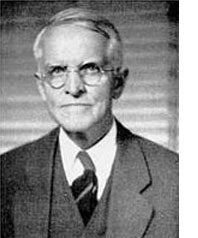Sesquicentennial of Wesley Clair Mitchell’s Birth
Today marks the sesquicentennial of the birth of Wesley Clair Mitchell (1874–1948), who played a formative role in creation of the NBER and served as the organization’s director of research from its founding in 1920 until 1945.
Recruiting a group of researchers dedicated to improving economic measurement, Mitchell guided early projects estimating labor’s share of national income, measuring the unemployment rate, and tracking business cycle fluctuations. His 1927 monograph Business Cycles: The Problem and Its Setting introduced the term “recession” for economic contractions and provided the framework for much subsequent NBER work on turning points in macroeconomic activity.
One of Mitchell’s students, Simon Kuznets, led the NBER research that laid the foundation for modern national income accounting.
Mitchell was the first recipient of the American Economic Association’s Francis A. Walker Medal recognizing the economist who had made the most significant contributions to economics over the course of their career. Mitchell’s research accomplishments are celebrated in a volume edited by another of his students, Arthur Burns, who followed him as the NBER’s director of research and later became chair of the Board of Governors of the Federal Reserve System.



